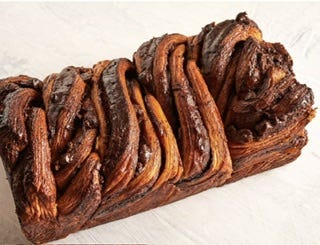It's A Busy Summer Sunday, So Here's A Buffet of News
All kinds of things are happening, including the Paris Olympics
Hello, CulinaryWoman subscribers! If this is your first newsletter, welcome, and thank you to all my returning readers. It’s the absolute peak of summer, and wow, is there a lot going on, from sports to travel to politics and of course, dining. I hope nobody got stuck in the big tech meltdown and that your life is back in gear.
CulinaryWoman is now entering its fifth year, and it doesn’t rely on ads or sponsors and we only collect a few pennies from sales via Amazon. So, please think about a paid subscription and help support what we do.
This week, I’m bringing you a buffet of quick items to help speed you through your Sunday and into the week.
What’s Being Served At The Olympic Village
On the eve of the Paris Olympics, French President Emmanuel Macron visited the Olympic Village and sat down for lunch with some of the athletes. He ordered a slice of margherita pizza with basil, not a typically French dish, but maybe because it was easy to eat on the fly.
The athletes are being offered a vast array of food at six restaurants, starting with baskets of croissants, of course, and the complex has its own bakery churning out baguettes. However, not everyone is happy.
L’Equipe, the French sports paper, reported that there was a shortage of eggs as well as grilled meats for breakfast. One reason is that the Paris games are trying to reduce their carbon footprint, and emphasize more vegetarian dishes. That can be a challenge for athletes who rely on protein as fuel, although there are lots of carbohydrates around to carbo-load.
The British team felt they were not getting enough food, and brought in their own chef. The Korean team has a group of cooks turning out an array of small dishes, called banchan, as well as heartier fare.
Still, the kitchens are feeding 46,000 athletes and it expects to churn out more than 60,000 meals a day through Aug. 4.
Move Over Croissants: Babka Is Now Trendy
I’ve made no secret of my disdain for croissants that push the envelope past their original form, like the crookies that have been a viral trend.
Now, it seems that babka is saying, “Hold my glass of tea.” Hey, Alma reports that babka has burst forth into multiple flavors, well beyond the cinnamon and chocolate that traditionally have been the most prevalent.
Nutella babka, which the publication found in London, is just a start. Bakeries around the world are making sweet and savory babkas, including some flavored with ube, Reese’s Pieces and rainbow breakfast cereal, along with brie and guava.
I’ve tried babka with red bean paste at Ayu Bakehouse in New Orleans, which is delicious, and I’ve seen a matcha version, too.
To be honest, I never tasted the heartier versions of babka until I was a grown up. When I was a child, my mother bought babka from a small European bakery nearby.
Its babka was more like fluffy challah, baked in an angel food tin, which came plain. We tore off pieces and toasted them with butter, or added jam. In scouting around for a recipe, I think this was actually the Russian Easter cake known as kulich, which got renamed as babka at that bakery.
I’m intrigued by the new versions which I assume will be popping up near me (although hold the Fruity Pebbles).
Austrian Restaurants Debate The Schnitzel Bonus
On my trips to Vienna, I enjoyed sampling dishes in season. Spring is known for spargel, the thick white asparagus, along with young chicken, and strawberries.
It turns out there is a new government subsidy that restaurants can receive for offering traditional Austrian dishes. It’s known as the Schnitzel Bonus. Twenty restaurants have been selected to receive the payments of 10,000 Euros each, or about $11,000.
The plan is supposed preserve Austrian’s traditional culinary culture, and assist restaurants that might be in danger of going under. But according to the Times of London, that has caused some resentment.
Italian, Turkish and Hungarian restaurants do not qualify, even though they might serve dishes similar to Austrian foods, some of which are influenced by those cultures. Owners of places that serve international food, such as Greek, Thai, or Chinese, are left out as well.
Robert Seeber, tourism industry spokesman at the Austrian Federal Economic Chamber, said: “The schnitzel bonus is very problematic. It is one-dimensional and discriminates against other businesses.”
The conservative state government remains adamant that the bonus is a good idea. “We don’t want to reach the point at which the schnitzel can only be seen in a museum,” said Udo Karl Landbauer of the Freedom Party, the deputy governor of Lower Austria.
Farewell To Two People Important To Me
This was a poignant week of personal passages. One of my favorite reporting assignments for the New York Times was a story about the 50th anniversary of the Four Tops in 2004.
I got to spend a day with Abdul “Duke” Fakir, who was then one of the two original Tops still with the group. We drove around Detroit, visiting locations connected to the Tops, and he took me to the Motown Museum. We stood in the very Motown Records studio where he, Levi Stubbs, Obie Benson, and Lawrence Payton recorded their many hits, like Reach Out (I’ll Be There), Bernadette and so many more.
Duke told me that Motown founder Berry Gordy could hear the sessions from upstairs in his office. If he came running down the stairs to the studio, the group knew that they had a hit.
I got to see Duke perform one final time in New Orleans last year, when the Tops and the Temptations played a lively concert in the Saenger Theater. By then, Duke was recovering from hip surgery, and he spent some of the evening seated on a tall stool, but he was still able to do a few steps.
Duke died last week at age 89. I’m sure he’s already harmonizing up above with Levi, Obie and Lawrence.
It was also sad to wake up to the news this week that Dan Collins had died. He was married to Gail Collins, the distinguished New York Times columnist, who wrote this lovely tribute to their 50-plus year marriage.
I got to know Dan early in my career, when we both worked at U.S. News & World Report. When I moved to New York City to work for New York Newsday, Dan became like a big brother and sherpa. He took me to newspaper bars, introduced me to a variety of media figures and gave me a tutorial about the way the city worked.
He was one of the funniest men I ever met, with a gravely voice that declared, “Dan Collins!” when he answered the phone.
He was absolutely devoted to Gail, who achieved her ambition of moving beyond reporting to become an editorial writer and then a respected author and columnist. Dan co-wrote several books as well, bursting the bubbles around mayors such as Ed Koch and Rudolph Giuliani.
If you’ve ever seen You’ve Got Mail, you’ll remember the scene where Meg Ryan’s character mourns the loss of her children’s bookstore. Every store and restaurant closing causes my New York to vanish, and Danny’s death takes away a big chunk of the city for me, too.
Rest in peace, Dan. Rest in power, Duke.
Dress Shirts With A Side of Lox
But, a piece of my New York remains, and it’s getting some welcome attention.
Nordstrom, the Seattle-based department store chain, has been trying to ingratiate itself with New York City shoppers since it opened a store there five years ago. In its latest marketing campaign, it is highlighting some iconic New York businesses, including a famous name in lox: Barney Greengrass.
The Upper West Side deli is featured in advertisements on bus stops, as well as in print, digital and social media, reports JTA.org.
Models are pictured pointing out smoked fish at Barney Greengrass’ famous deli counter. Nordstrom also filmed interviews with the stores’ owners, including Gary Greengrass, the third-generation owner of the classic Upper West Side restaurant, who gives a brief history of the 116-year-old Jewish deli.
“We’ve been in business since 1908,” Greengrass says in a video interview posted on Instagram. “Barney Greengrass is my grandfather. I learned this trade of the smoked fish business down on the Lower East Side. We’re called ‘Barney Greengrass The Sturgeon King.’ The moniker of The Sturgeon King was coined by a New York state senator named James Frawley back in the early 1900s.”
When I was a Columbia University student, I’d take the bus down Broadway to Zabar’s, and walk over Barney Greengrass on Amsterdam to get the bus home. (Yes, the bus. I liked to look out the windows.)
I tasted my first smoked sturgeon there, and I reveled in the authentic New York atmosphere. I’m glad to know the Sturgeon King still reigns.
Keeping Up With CulinaryWoman
This week, I wrote about cars for the Boston Globe — or, the lack of cars in Detroit auto company lineups. As of this summer, there were just eight car models spread across the three car companies, versus more than 70 SUVS, crossovers and pickups, which are collectively called “light trucks.”
To be sure, there are lots of car choices left among international nameplaces, in part because those companies sell far more cars overseas than they do light trucks. The shift to these bigger vehicles is tearing up American roads, and causing problems in communities, where parking spaces are sized for cars and pedestrian deaths are rising.
The latest episode of the Lions, Towers & Shields podcast focuses on Double Indemnity, the 1944 film that some say is the epitome of film noir. It’s a movie full of contradictions, including the wardrobe.
If you’d like to get in touch, I am happy to hear from you. Here is how to reach me.
Website: www.michelinemaynard.com
Email: culinarywoman (@) gmail dot com
LinkedIn: Micheline Maynard
Threads and Instagram: (@) michelinemaynard
Etsy shop: City Tips Vintage
Tomorrow, I’ll be back for our paid subscribers with Red Beans & Advice. I’m going to talk about The Great British Bake Off and how it has become a constant source of new cookbooks from its bakers.
See you soon, and go Team USA!









